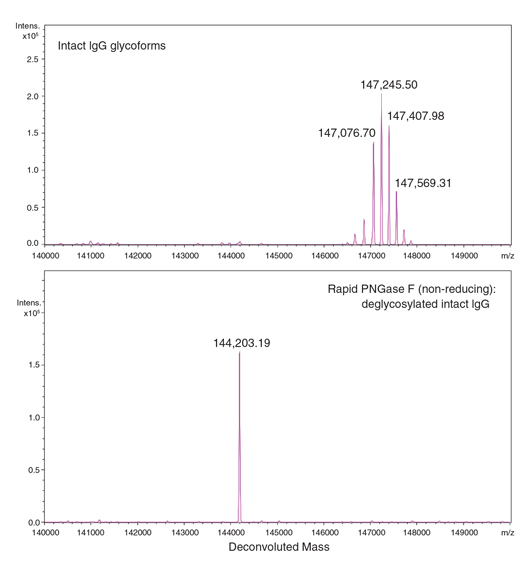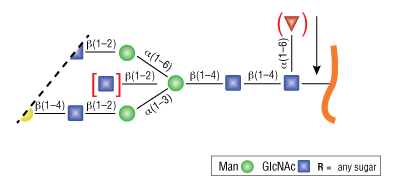上海金畔生物科技有限公司代理New England Biolabs(NEB)酶试剂全线产品,欢迎访问官网了解更多产品信息和订购。
产品信息

PNGase F is the most effective enzymatic method for removing almost all N-linked oligosaccharides from glycoproteins. PNGase F digestion deaminates the aspargine residue to aspartic acid, and leaves both the protein and the oligosaccharide intact, keeping them suitable for further analysis (1).
Developed for proteomic applications, Rapid PNGase F (non-reducing format) is a reformulated version of Rapid PNGase F (NEB #P0710 ) that allows the complete and rapid deglycosylation of antibodies and fusion proteins in minutes, while preserving disulfide bonds. All N-glycans are released rapidly and without bias, facilitating high throughput proteomics applications and methods for antibody characterization by mass spectrometry such as intact mass analysis. Rapid PNGase F (non-reducing format) combines the advantages of Rapid PNGase F (fast processing time), with the non-reducing conditions preserving quaternary structure.

特异性
Rapid PNGase F (non-reducing format) cleaves all complex, hybrid and high-mannose type glycans from antibodies and related proteins. Core α1,3 fucosylation (found in immunoglobulins expressed in plant or insect cells) is resistant to both Rapid PNGase F and PNGase F.

- 产品类别:
- Endoglycosidases Products,
- Proteome Analysis Products
- 应用:
- Expression Systems,
- Proteomics,
- Recombinant Glycoprotein Expression,
Glycoprotein Analysis
-
产品组分信息
本产品提供以下试剂或组分:
NEB # 名称 组分货号 储存温度 数量 浓度 -
P0711S 4 Rapid™ PNGase F (non-reducing format) P0711SVIAL 4 1 x 0.05 ml 50 reactions Rapid PNGase F (non-reducing format) Buffer B0717SVIAL 4 1 x 0.2 ml 5 X
-
-
特性和用法
反应条件
1X Rapid PNGase F (non-reducing format) Buffer
Incubate at 50°C贮存溶液
20 mM Tris-HCl
50 mM NaCl
5 mM EDTA
pH 7.5 @ 25°C热失活
75°C for 10 minutes
-
优势和特性
应用特性
Rapid PNGase F (non-reducing format) is effective on a variety of antibodies despite their structural diversity. Intact protein characterization using Rapid PNGase F (non-reducing format) is convenient, and complete (reducing biased results). The fast processing time decreases the risk of artifacts and unwanted protein modifications (oxidation, deamidation) that could be introduced by lengthy incubations with standard N-glycan removal protocols. Samples are ready to be prepared for downstream chromatography or mass spectrometry analysis, providing accurate and reproducible results.
For streamlined proteomic workflows, Rapid PNGase F (non-reducing format) is directly compatible with Trypsin-ultra™, Mass Spectrometry Grade (NEB #P8101 ).
-
相关产品
相关产品
- p6043-rapid-pngase-f-antibody-standard
- Endo S
- Trypsin-ultra™, Mass Spectrometry Grade
- Rapid 快速 PNGase F
-
注意事项
- Storage: It is recommended to store this kit at 4°C. All components will be stable for at least one year if stored correctly. Do not freeze.
- The pre-incubation step at 75°C is strictly required. Deglycosylationtakes place once the enzyme is added and incubated at 50°C.
- The target protein should be in a solution compatible with Rapid PNGase F(non-reducing format) activity. Avoid buffers containing SDS, as itinhibits PNGase F. Common stabilizing reagents such as Tween, TritonX-100, NP-40, octyl glucoside and non-detergent sulfobetaine, as well astraces of organic solvents, can prevent optimal rapid deglycosylation.
- Buffer exchange (by dialysis, spin columns, or microfiltration) isrecommended to prepare samples for liquid chromatography/massspectrometry.
-
参考文献
- Maly, F. et al. (1989). Anal. Biochem. 180, 195-204.
操作说明、说明书 & 用法
-
操作说明
- Rapid PNGase F (non-reducing format) (P0711) Reaction Protocol
- Rapid PNGase F (non-reducing format) (P0711) SDS-PAGE Protocol
- Glycoproteomics: Buffer Exchange Protocols (P0711)
-
应用实例
- Glycan Analysis of Murine IgG2a by Enzymatic Digestion with PNGase F and Trypsin, Followed by Mass Spectrometric Analysis
- Detailed Characterization of Antibody Glycan Structure using the N-Glycan Sequencing Kit
工具 & 资源
-
选择指南
- Endoglycosidase Selection Chart
FAQs & 问题解决指南
-
FAQs
- What is the difference between Rapid PNGase F and Rapid PNGase F (non-reducing format)?
- What is the difference between Rapid PNGase F (non-reducing format) and Endo S (Endo S, NEB# P0741)?
- What are the components of Rapid PNGase F (non-reducing format)?
- How much antibody sample can be deglycosylated with Rapid PNGase F (non-reducing format)?
- What is a good control substrate for Rapid PNGase F?
- What should I do if my target protein is only partially deglycosylated with Rapid PNGase F (non-reducing format)?
- What buffers or additives should be avoided when using Rapid PNGase F (non-reducing format)?
- How can I test if the Rapid PNGase F (non-reducing format) reaction is complete in 10 minutes?
- Is Rapid PNGase F (non-reducing format) compatible with downstream mass spectrometry analysis?
- Is Rapid PNGase F (non-reducing format) only suitable for deglycosylation of antibodies?
- Are longer incubation times detrimental to the Rapid PNGase F (non-reducing format) reaction?
- What is the reaction temperature range for Rapid PNGase F (non-reducing format)?
- What happens to the asparagine residue after Rapid PNGase F removes the sugar?
- Can a protease inhibitor cocktail be used in a Rapid PNGase F (non-reducing format) reaction?
- Is the Rapid PNGase F (non-reducing format) reaction compatible with Trypsin-ultra™ (NEB# P8101)?
-
实验技巧
- If needed, reaction volumes can be scaled up or down, adjusting the amount of enzyme accordingly. Altering the components ratio will lead to suboptimal results (for instance, using a larger reaction volume with only 1 µl of enzyme).
- Reactions can be set up at room temperature.The pre-incubation step at 75°C is strictly required. The deglycosylation step takes place once Rapid PNGase F (non-reducing format) is added and incubated at 50°C.
- Typically, the reaction is completed after 10 minutes at 50°C. Incubation longer than 15 minutes will not result in further deglycosylation.
- If the reaction is not complete, try increasing the amount of Rapid PNGase F (non-reducing format) Buffer (up to 4 µl in a 10 µl total volume).
- For complex substrates, reducing agents are sometimes strictly required. In those cases, complete deglycosylation under non-reducing conditions might not be feasible. Rapid PNGase F (NEB #P0710 ) can be used instead.
